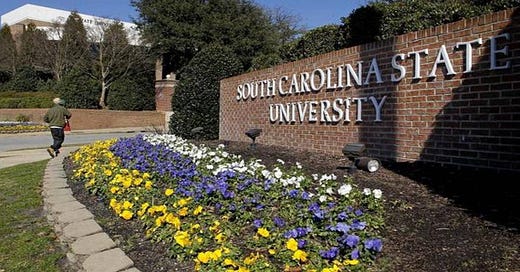The State: Is SC on Right Track to Overcome $500M Under-Funding of Historically Black SC State?
From The State …
Following years of financial turmoil at South Carolina State University and repeated pleas to state leaders for more funding, the federal government says the historically Black school has been severely under-funded by nearly $500 million over the past three decades. But some state lawmakers said the federal government’s claim is “suspicious” and lacks considerable context.
Now, advocates for historically Black colleges and South Carolina lawmakers say that while funding disparities have, indeed, contributed to financial and development struggles experienced by S.C. State, in recent years, the General Assembly has awarded S.C. State more money per student than other public universities, including its land-grant counterpart, Clemson. But some worry that “antipathy” toward the Biden administration in this state - and suspicion about the timing of this notice in the midst of presidential campaign season - could keep state leaders from taking significant remedial action to right what could be counted as generations of inequality.
In a September letter to Gov. Henry McMaster, the U.S. Departments of Agriculture and Education called on South Carolina and 15 other - mostly Southern - states to reassess how those states fund their public HBCUs compared to their predominately white land-grant counterparts, such as Clemson University. Using data from the National Center for Education Statistics, the federal government determined that 16 of the nation’s 19 historically Black 1890 land-grant universities, including S.C. State, have been underfunded by their states by a total of $13 billion.
Alton Thompson, who serves as the executive director for the 1890 Association of Research Directors and on the board of directors for the 1890 Universities Foundation, said South Carolina, more than any other Southern state, has begun to make strides toward rectifying funding inequities between S.C. State and Clemson. But even in light of those efforts, he said he hopes legislators will continue to increase support for S.C. State in consideration of funding inequities for decades. “South Carolina is one of the few states that have really made a commitment to making up the funding difference,” between S.C. State and Clemson, Thompson said. “But in terms of a long-term systemic impact, it’s really going to take a long time to reconcile those funding disparities.”




